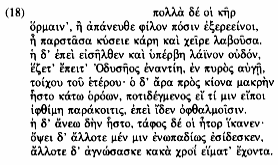|
|
|
|
|
|
|
enemies and abhors the idea of marrying one of them, she still manages to elicit gifts from them. She uses sweet words though her feelings towards them are anything but sweet. This, in my view, is the meaning of  here. Only Odysseus, not the love-struck suitors (cf. 2123), notices the insincerity of Penelope's sweet tone; the latter hasten to shower presents on her (284301). Of course Odysseus also smiles, because he knows Penelope's remarriage will never take place. We see that Athena's goals of 1602 have been reached: the suitors are even more smitten with desire for Penelope, while she has enhanced her value to her husband, exploiting the desire of the suitors to replenish his treasury. here. Only Odysseus, not the love-struck suitors (cf. 2123), notices the insincerity of Penelope's sweet tone; the latter hasten to shower presents on her (284301). Of course Odysseus also smiles, because he knows Penelope's remarriage will never take place. We see that Athena's goals of 1602 have been reached: the suitors are even more smitten with desire for Penelope, while she has enhanced her value to her husband, exploiting the desire of the suitors to replenish his treasury. |
|
|
|
|
|
|
|
|
The second instance of Penelope's silent thoughts is found at the beginning of book 23. She has just been told by Eurycleia that Odysseus has returned and killed the suitors. In the ensuing dialogue we see Penelope displaying scepticism (1124), joy (323), and again disbelief (5968). In the end she decides to go down to the hall and take a look herself:  (834). It is clear from her last words ('the man who killed them') that Penelope is still not convinced that the avenger is really Odysseus. The oscillation of her mind, wavering between hope and fear, belief and disbelief continues in the magnificent passage of unspoken thought which now follows: (834). It is clear from her last words ('the man who killed them') that Penelope is still not convinced that the avenger is really Odysseus. The oscillation of her mind, wavering between hope and fear, belief and disbelief continues in the magnificent passage of unspoken thought which now follows: |
|
|
|
|
|
|
|
|
 |
|
|
|
 |
|
 |
|
|
She spoke, and came down from her chamber, her heart pondering
much, whether to keep away and question her dear husband,
or to go up to him and kiss his head, taking his hands.
But then, when she came in and stepped over the stone threshold,
she sat across from him in the firelight, facing Odysseus,
by the opposite wall, while he was seated by the tall pillar,
looking downward, and waiting to find out if his majestic
wife would have anything to say to him, now that she saw him.
She sat a long time in silence, and her heart was stupefied.
At one time she would look at him full in the face,
at another she would fail to recognize him because of his poor clothes.
(Od. 23.8595) |
|
|
|
|
|